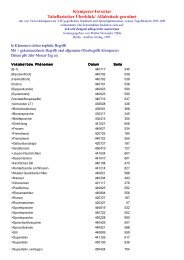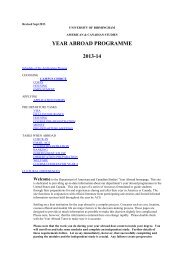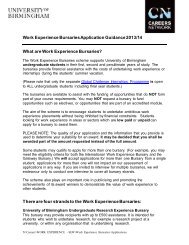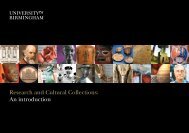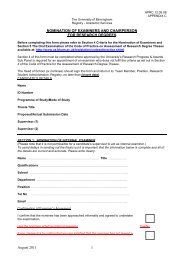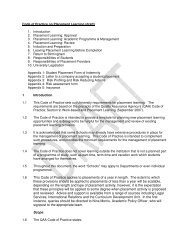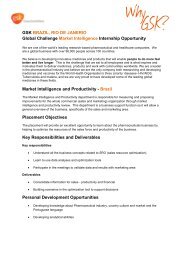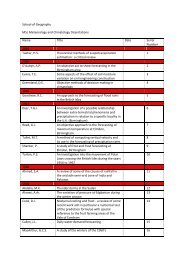What's the difference? - University of Birmingham
What's the difference? - University of Birmingham
What's the difference? - University of Birmingham
You also want an ePaper? Increase the reach of your titles
YUMPU automatically turns print PDFs into web optimized ePapers that Google loves.
32 The <strong>Birmingham</strong> Magazine<br />
Research focus<br />
Caring for<br />
carers<br />
Grief, loss, isolation and anger are just some<br />
<strong>of</strong> <strong>the</strong> emotions experienced by carers <strong>of</strong> <strong>the</strong><br />
700,000 people with dementia in <strong>the</strong> UK.<br />
Broadcaster John Suchet showed how<br />
devastating seeing <strong>the</strong> person you love turn<br />
into someone who does not know you can be<br />
when he broke down in tears while telling <strong>the</strong><br />
BBC about his wife’s Alzheimer’s in February.<br />
‘The Bonnie I loved has actually gone. It’s<br />
as if she has died. Dementia has taken her,’<br />
he said.<br />
Researchers at <strong>Birmingham</strong> are working<br />
to identify <strong>the</strong> problems John and carers like<br />
him face and <strong>the</strong> best ways to support <strong>the</strong>m.<br />
They are led by clinical psychologist Dr Jan<br />
Oyebode, who came to <strong>the</strong> <strong>University</strong> after<br />
17 years with <strong>the</strong> NHS specialising in helping<br />
older people with dementia and <strong>the</strong>ir carers<br />
and still works as a consultant one day a<br />
week with South <strong>Birmingham</strong> Mental Health<br />
Trust.<br />
‘With a condition like dementia <strong>the</strong>re<br />
are real difficulties because <strong>the</strong> person’s<br />
cognitive processes are affected and<br />
<strong>the</strong> carer can start to feel <strong>the</strong>y are losing<br />
<strong>the</strong>m before <strong>the</strong>y’ve died and may grieve in<br />
advance,’ she says. ‘That sort <strong>of</strong> discontinuity<br />
may help <strong>the</strong> carer but <strong>the</strong> problem with that<br />
is that inevitably <strong>the</strong>y will lose empathy with<br />
<strong>the</strong> person with dementia and will be less<br />
able to comfort <strong>the</strong>m.<br />
‘Although <strong>the</strong> patient with dementia<br />
Supporting carers: Admiral Nurse Ian Wea<strong>the</strong>rhead with John Suchet (left)<br />
may behave in a very confusing way, <strong>the</strong>y’re<br />
actually still <strong>the</strong>re inside it all. If you can try<br />
to understand <strong>the</strong> way <strong>the</strong>y’re behaving,<br />
you can maintain empathy in a way that<br />
helps <strong>the</strong>m and bring out <strong>the</strong> best in <strong>the</strong>m,<br />
and so that may help you as well.’<br />
Support for carers and families is available<br />
from UK charities and from Admiral Nurses,<br />
specialist nurses employed by <strong>the</strong> NHS<br />
who advise on all aspects <strong>of</strong> dementia,<br />
from <strong>the</strong> best care packages to coping<br />
with behavioural changes.<br />
A community mental health nurse by<br />
background, Ian Wea<strong>the</strong>rhead (PG Diploma<br />
Criminology, 1995) became an Admiral<br />
Nurse for <strong>the</strong> Central North West London<br />
Foundation Trust in 2006. ‘It is a challenging<br />
job but is more rewarding than any o<strong>the</strong>r job<br />
I’ve done,’ he says.<br />
Ian is John Suchet’s Admiral Nurse and<br />
Picture: Rhonda Smith: Minerva PRC<br />
in July was appointed as Lead Nurse for <strong>the</strong><br />
national helpline Admiral Nursing DIRECT,<br />
which is manned by trained Admiral Nurses.<br />
Ian says: ‘John talking about dementia so rawly<br />
and passionately touched a nerve with many<br />
people and helped to raise awareness <strong>of</strong> <strong>the</strong><br />
many issues that families and carers face.’<br />
Dr Oyebode’s research has shown that<br />
carers are more likely to have mental and<br />
physical health problems than non-carers:<br />
‘Really <strong>the</strong> health service needs to be looking<br />
after both people, not just <strong>the</strong> person who’s<br />
<strong>the</strong> identified patient. Admiral Nurses and <strong>the</strong><br />
charities For Dementia and <strong>the</strong> Alzheimer’s<br />
Society are really good at providing services<br />
that provide for carers’ needs and giving <strong>the</strong>m<br />
opportunities to come toge<strong>the</strong>r,’ she says.<br />
For fur<strong>the</strong>r information about dementia,<br />
visit www.fordementia.org.uk<br />
Baby it’s you<br />
Psychologists are carrying out direct research<br />
with infants for <strong>the</strong> first time in <strong>the</strong> <strong>University</strong>’s<br />
new multimedia Babylab.<br />
Set in a refurbished area <strong>of</strong> <strong>the</strong> Frankland<br />
Building especially designed to be family<br />
friendly, <strong>the</strong> Babylab includes a habituation<br />
lab and EEG equipment to measure brain<br />
activity. There is also an observation room<br />
with cameras so children can be watched<br />
at play and a soundpro<strong>of</strong> booth to ensure<br />
sensitive experiments are not disturbed.<br />
Undergraduate students are being recruited<br />
to help run <strong>the</strong> lab and will also help to build<br />
up a database <strong>of</strong> volunteer parents and children<br />
to participate in research. The Babylab was<br />
funded by alumni and projects currently<br />
underway include testing influences on<br />
word learning, identifying biomarkers <strong>of</strong><br />
autism and examining feeding behaviours.<br />
Babylab: Dr Joe McCleery with mum Maria Brophy and<br />
ten-week-old Cian


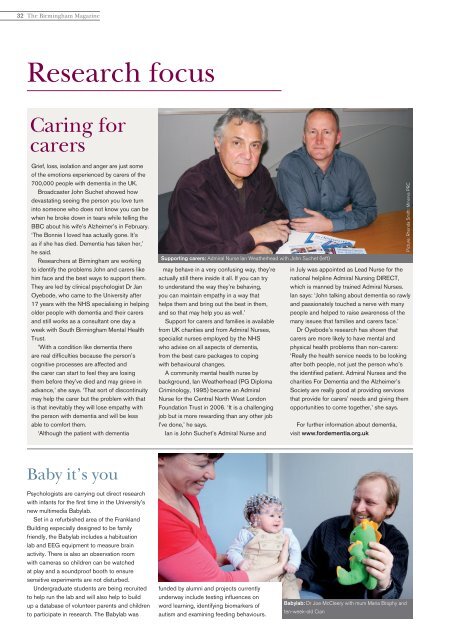
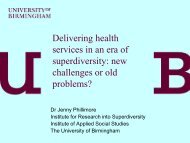
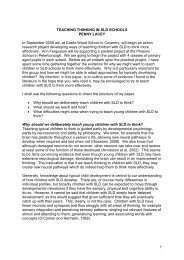
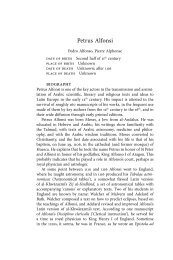
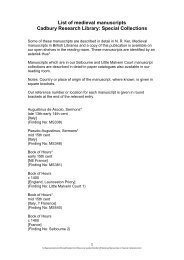
![Benyamin Asadipour-Farsani [EngD Conference abstract]](https://img.yumpu.com/51622940/1/184x260/benyamin-asadipour-farsani-engd-conference-abstract.jpg?quality=85)

